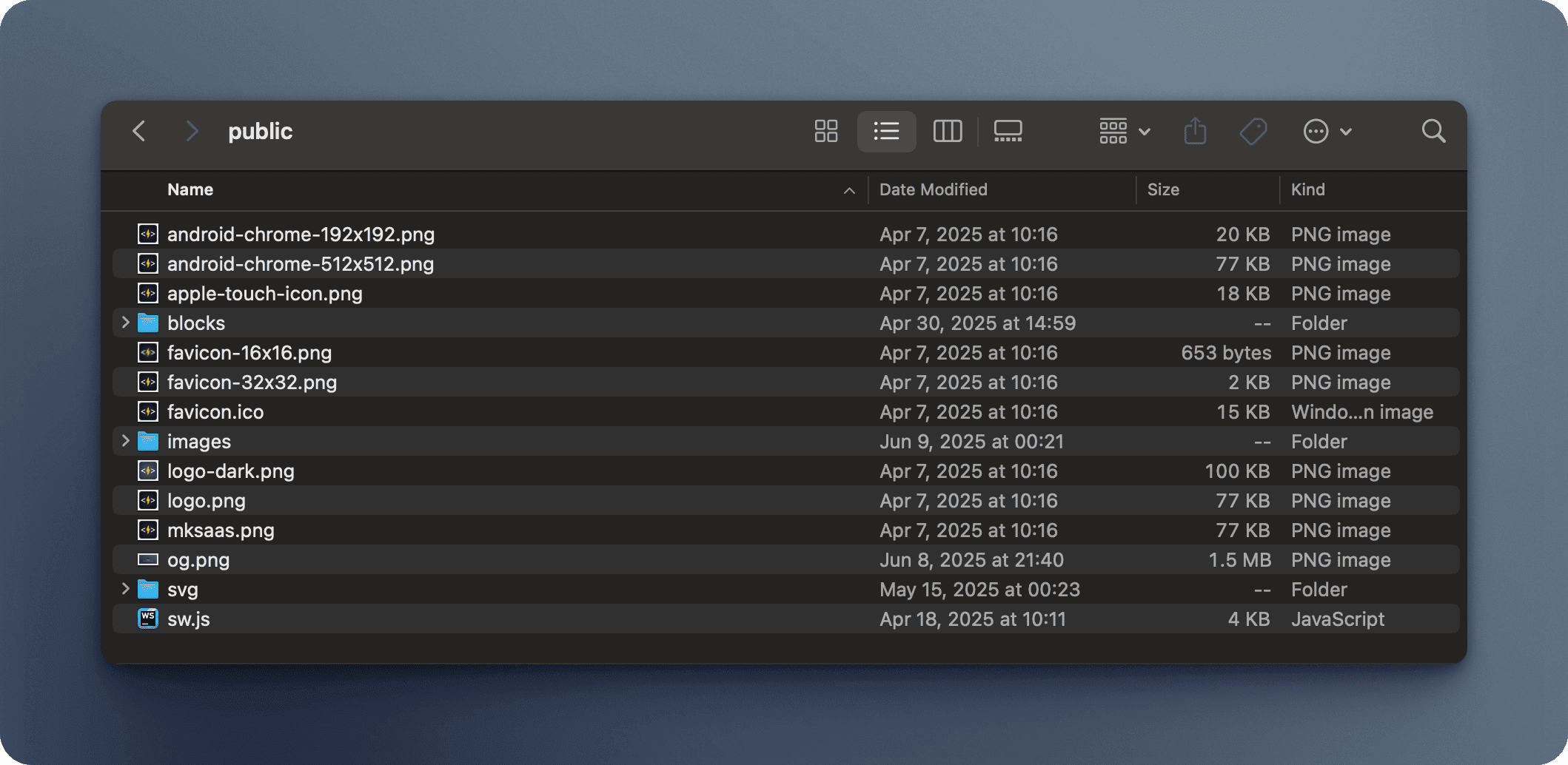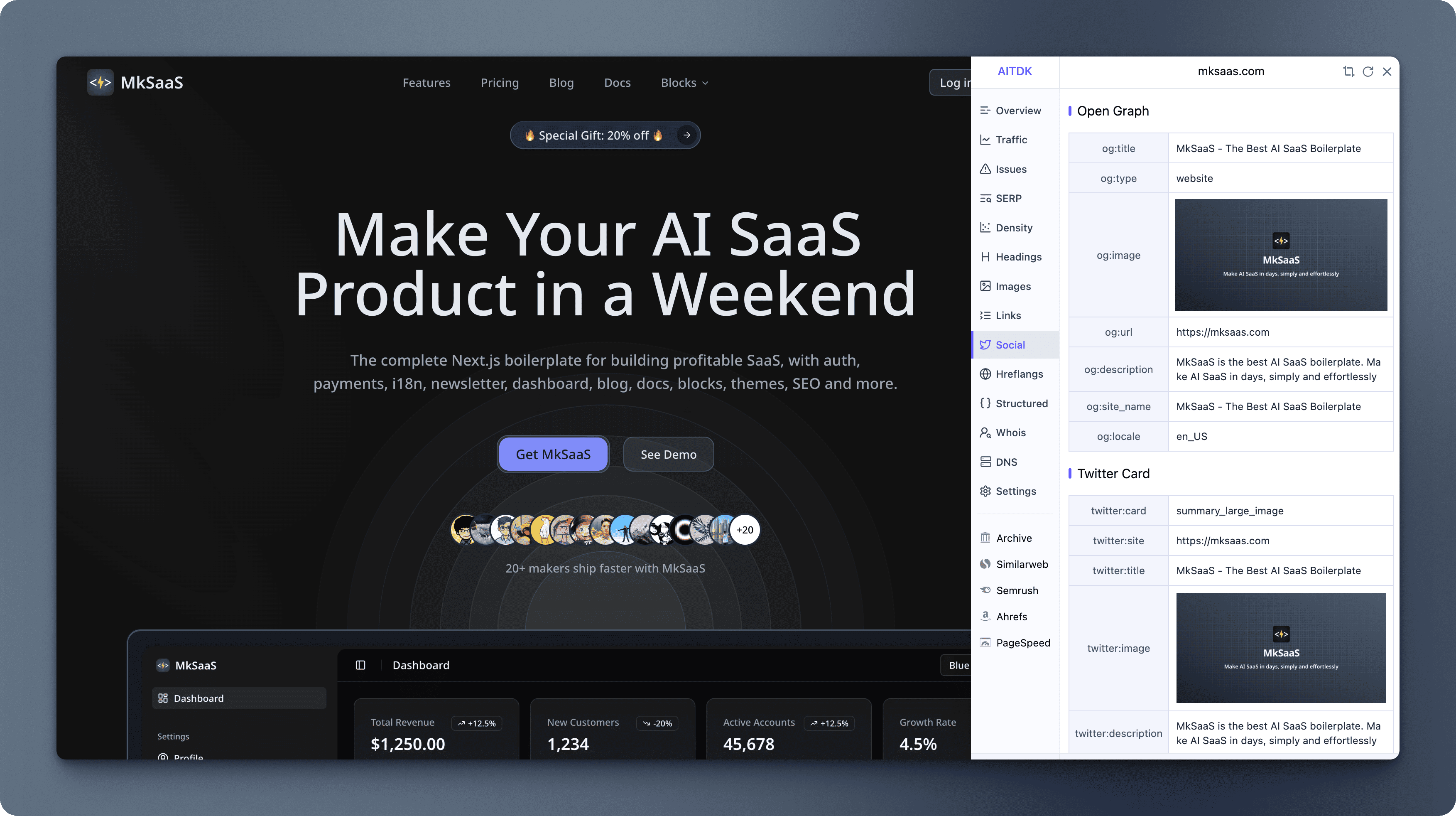Metadata
Learn how to customize metadata for your MkSaaS website
This guide covers the metadata system in your MkSaaS website, how to customize SEO-related information, and how to configure social sharing metadata for optimal visibility.
Core Features
The MkSaaS template comes with a robust metadata system that provides:
- SEO-optimized page titles and descriptions
- Social media sharing metadata (Open Graph and Twitter)
- Favicon and app icons
- Internationalization support for metadata
Understanding the Metadata System
The metadata system in MkSaaS is built on Next.js metadata API and is configured through several key files:
1. Website Configuration
The main website configuration is defined in src/config/website.tsx:
export const websiteConfig: WebsiteConfig = {
metadata: {
mode: {
defaultMode: 'dark',
enableSwitch: true,
},
images: {
ogImage: '/og.png',
logoLight: '/logo.png',
logoDark: '/logo-dark.png',
},
social: {
github: 'https://github.com/MkSaaSHQ',
twitter: 'https://x.com/mksaascom',
discord: 'https://mksaas.link/discord',
youtube: 'https://www.youtube.com/@MkSaaS',
},
},
// Other configuration sections...
};This configuration defines:
- Default theme and dark mode settings
- Logo and Open Graph image paths
- Social media official account links
2. Translation Files
The basic website metadata such as name, title, and description are defined in the translation files:
{
"Metadata": {
"name": "MkSaaS",
"title": "MkSaaS - The Best AI SaaS Boilerplate",
"description": "MkSaaS is the best AI SaaS boilerplate. Make AI SaaS in days, simply and effortlessly"
},
// other translations...
}{
"Metadata": {
"name": "MkSaaS",
"title": "MkSaaS - 快速构建 AI SaaS 产品",
"description": "MkSaaS 是一个使用最先进的技术栈构建的 AI SaaS 模板,它可以帮助你更快更好地构建你的 AI SaaS 网站。"
},
// 其他翻译...
}3. Metadata Construction
The constructMetadata function in src/lib/metadata.ts can create the metadata object for each page:
export function constructMetadata({
title,
description,
image,
noIndex = false,
locale,
pathname,
}: {
title?: string;
description?: string;
image?: string;
noIndex?: boolean;
locale?: Locale;
pathname?: string;
} = {}): Metadata {
title = title || defaultMessages.Metadata.title;
description = description || defaultMessages.Metadata.description;
image = image || websiteConfig.metadata.images?.ogImage;
const ogImageUrl = getImageUrl(image || '');
// Generate canonical URL from pathname and locale
const canonicalUrl = locale
? getUrlWithLocale(pathname || '', locale).replace(/\/$/, '')
: undefined;
// Generate hreflang alternates if pathname is provided and we have multiple locales
const alternates =
pathname && routing.locales.length > 1
? {
canonical: canonicalUrl,
...generateAlternates(pathname),
}
: canonicalUrl
? { canonical: canonicalUrl }
: undefined;
return {
title,
description,
alternates,
openGraph: {
type: 'website',
locale: locale ? getCurrentHreflang(locale).replace('-', '_') : 'en_US',
url: canonicalUrl,
title,
description,
siteName: defaultMessages.Metadata.name,
images: [ogImageUrl.toString()],
},
twitter: {
card: 'summary_large_image',
title,
description,
images: [ogImageUrl.toString()],
site: getBaseUrl(),
},
icons: {
icon: '/favicon.ico',
shortcut: '/favicon-32x32.png',
apple: '/apple-touch-icon.png',
},
metadataBase: new URL(getBaseUrl()),
manifest: `${getBaseUrl()}/manifest.webmanifest`,
...(noIndex && {
robots: {
index: false,
follow: false,
},
}),
};
}This function handles:
- Setting default values from translations
- Configuring Open Graph and Twitter card metadata
- Setting up favicon and icon information
- Managing canonical URLs and robots directives
Customizing Website Metadata
Basic Website Information
To change the basic website information like name, title, and description:
- Edit the
messages/en.jsonfile:
{
"Metadata": {
"name": "Your Website Name",
"title": "Your Website Title - Tagline",
"description": "A detailed description of your website for SEO purposes"
}
}For multilingual websites, update each language file with appropriate translations:
{
"Metadata": {
"name": "您的网站名称",
"title": "您的网站标题 - 标语",
"description": "您网站的详细描述,用于 SEO 目的"
}
}Customizing Social Images
To change the Open Graph image and logos:
- Place your image files in the
publicdirectory - Update the paths in
src/config/website.tsx:
metadata: {
// Other settings...
images: {
ogImage: '/your-og-image.png', // Used for social sharing
logoLight: '/your-logo-light.png', // Logo for light mode
logoDark: '/your-logo-dark.png', // Logo for dark mode
},
}Recommended sizes:
- OG Image: 1200×630 pixels for optimal display on social platforms
- Logo: At least 512×512 pixels for high-resolution displays
Social Media Links
Update your social media official account links in the website configuration:
metadata: {
// Other settings...
social: {
github: 'https://github.com/YourUsername',
twitter: 'https://x.com/YourHandle',
discord: 'https://discord.gg/YourInvite',
youtube: 'https://www.youtube.com/@YourChannel',
// Add other social platforms as needed
},
}Favicons and App Icons
To replace the default favicons and app icons:
- Generate a complete set of icons using a tool like Real Favicon Generator
- Place the generated files in the
publicdirectory - Update the paths in the
constructMetadatafunction if necessary:
icons: {
icon: '/favicon.ico',
shortcut: '/favicon-32x32.png',
apple: '/apple-touch-icon.png',
},
Canonical URLs
For pages with multiple URLs or to prevent duplicate content issues, set canonical URLs:
export const metadata = constructMetadata({
title: 'Example Page',
description: 'Description',
canonicalUrl: 'https://=YOUR-DOMAIN.com/preferred-path',
});No-Index Pages
For pages you don't want indexed by search engines:
export const metadata = constructMetadata({
title: 'Private Page',
description: 'This page is not for search engines',
noIndex: true,
});Page-Specific Metadata
Adding Metadata to MDX Pages
In your MDX content pages (blog posts, docs, etc.), you can define metadata in the frontmatter:
---
title: Example Blog Post
description: This is an example blog post with custom metadata
image: https://cdn.mksaas.com/mksaas/images/blog/example-post.png
---
Content goes here...The metadata system will automatically use these values when rendering the page.
Programmatic Metadata
For other functional pages, you can use the constructMetadata function:
import { constructMetadata } from '@/lib/metadata';
export const metadata = constructMetadata({
title: 'Example Page',
description: 'This is an example page with custom metadata',
image: '/images/example-page.png',
});Custom Open Graph Data
For pages that need specific Open Graph data:
import { Metadata } from 'next';
import { constructMetadata } from '@/lib/metadata';
export const metadata: Metadata = {
...constructMetadata({
title: 'Custom Page',
description: 'Description',
}),
openGraph: {
type: 'article',
publishedTime: '2023-01-01T00:00:00.000Z',
authors: ['Author Name'],
// Other article-specific fields
},
};Test Social Sharing
Use tools like AITDK Chrome Extension to test your social sharing metadata.

Best Practices
- Keep Titles Concise: Aim for titles under 60 characters for optimal display in search results
- Descriptive Meta Descriptions: Write compelling descriptions of 150-160 characters
- Use High-Quality Images: Create professional, relevant images for OG and Twitter cards
- Include Keywords: Incorporate relevant keywords naturally in titles and descriptions
- Update Consistently: Keep metadata current with your content changes
- Mobile Optimization: Ensure your metadata looks good on mobile devices
Video Tutorial
Next Steps
Now that you understand how to customize metadata in MkSaaS, explore these related topics:
 MkSaaS Docs
MkSaaS Docs